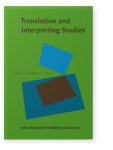Questioning translation readers
Investigating the impact of foreignization and domestication in three Chinese-speaking locales
Many claims have been made in translation studies regarding foreignization and domestication, but few empirical studies have been conducted to test those claims. Against this background, a survey was conducted to investigate the impact of foreignized and domesticated translations on three groups of Chinese readers. This study was conducted in two mainland Chinese cities (Beijing and Guangzhou) and one Taiwanese city (Douliou), including a total of 143 readers responding to two renditions of an English source text, one foreignized and one domesticated. The responses were then analyzed to determine the reader’s perception of the text in relation to the concepts of foreignization and domestication. Likewise, the responses were analyzed to determine whether the location of the study had an impact on the respondent’s answers. This paper presents findings of the study and concludes with a number of reflections on the now common concepts of “foreignization” and “domestication.”
References
Benjamin, Walter
1923, 1969 “
The Task of the Translator.” In
Illuminations,
Trans.
H. Zohn, ed. by
H. Arendt, 69–82. New York: Schocken.

Cheung, Martha
2010 “
From Partial Modernization to Total Transformation: Translation and Activism in Late-Qing China.” In
Compromiso Social y Traducción/Interpretación [
Translation/Interpreting and Social Activism], ed. by
Julie Boéri, and
Carol Maier, 93–105. Granada: ECOS(the Association of Translators and Interpreters for Solidarity).

Cronin, Michael
1996 Translating Ireland: Translation, Languages, Cultures. Cork: Cork University Press.

Fang, Huawen
2005 Zhongguo Fanyi Shi [
The Translation History of China in the 20th Century]. Xi’an: Northwest University Press.

Han, Shi
1992 Bashi Niandai: Gaibian Zhongguo de 33 Ben Shu [
1980s: Thirty-Three Books that Changed China]. Hong Kong: Cosmos Books Ltd.

Kalmar, Ivan, Zhong Yong, and Xiao Hong
1987 “
Language attitudes in Guangzhou, China.”
Language in Society 161: 499–507.


Lambert, Wallace E
1967 “
The Social Psychology of Bilingualism.”
Journal of Social Issues 23(2): 91–109.


Lu, Xun
1935, 2006 Qiejie Ting Zawen [
Qiejie Ting Prose]. Beijing: People’s Literature Publishing House.

Mao, Zedong
1942, 1968 “
Fandui Dang Bagu [Opposing the Conventionalized Writing in Party Documentation]”. In
Selected Mao Zedong’s Works, ed. by Mao Zedong Works Editing Committee, 787–803. Beijing: People’s Publishing House.

Mitchell, Margaret
1936 Gone with the Wind. New York: The Macmillan Company.

Spivak, Gayatri Chakravorty
1992 “
The Politics of Translation.” In
Destabilizing Theory, ed. by
Michèle Barrett, and
Anne Phillips, 177–200. Oxford: Polity Press.

Venuti, Lawrence
1995 The Translator’s Invisibility: A History of Translation. London: Routledge.


Wang, Qianting, Huiwen Chen, and Yong Zhong
2009 “
Foreign Is Not Unfamiliar: Foreign Is Not Unfamiliar: A Translation Impact Study Involving Taiwan Subjects.”
Meta 54 (2): 342–356.


Wen, Jun, and Xiaoying Gao
2003 “
Guihua yihua, ge ju yi ge [A functionalist critique of two Chinese translations of Gone with the Wind].”
Chinese Translators Journal 24 (5): 40–43.

Zhong, Yong, and Jie Lin
2007 “
Are Readers Lost in the Foreign Land? Investigating the Impact of Foreignized Translation in Guangzhou.”
Perspectives: Studies in Translatology 15 (1): 1–14.


Zhong, Yong
2014 “
Translation Matters: Impact of Two English Rendition of One Chinese Political Text on International Readers.”
T&I Review 31: 147–166.

Zhou, Zhenhuan
1996 Yingxiang Zhongguo Jindai Shehui de Yi Bai Zhong Yi Zuo [
One Hundred Translations that Changed Recent Chinese Society]. Beijing: China Foreign Translation Publishing House.

Cited by
Cited by 1 other publications
Hu, Bei
2022.
Feeling foreign: A trust-based compromise model of translation reception.
Translation Studies 15:2
► pp. 202 ff.

This list is based on CrossRef data as of 18 june 2024. Please note that it may not be complete. Sources presented here have been supplied by the respective publishers.
Any errors therein should be reported to them.
